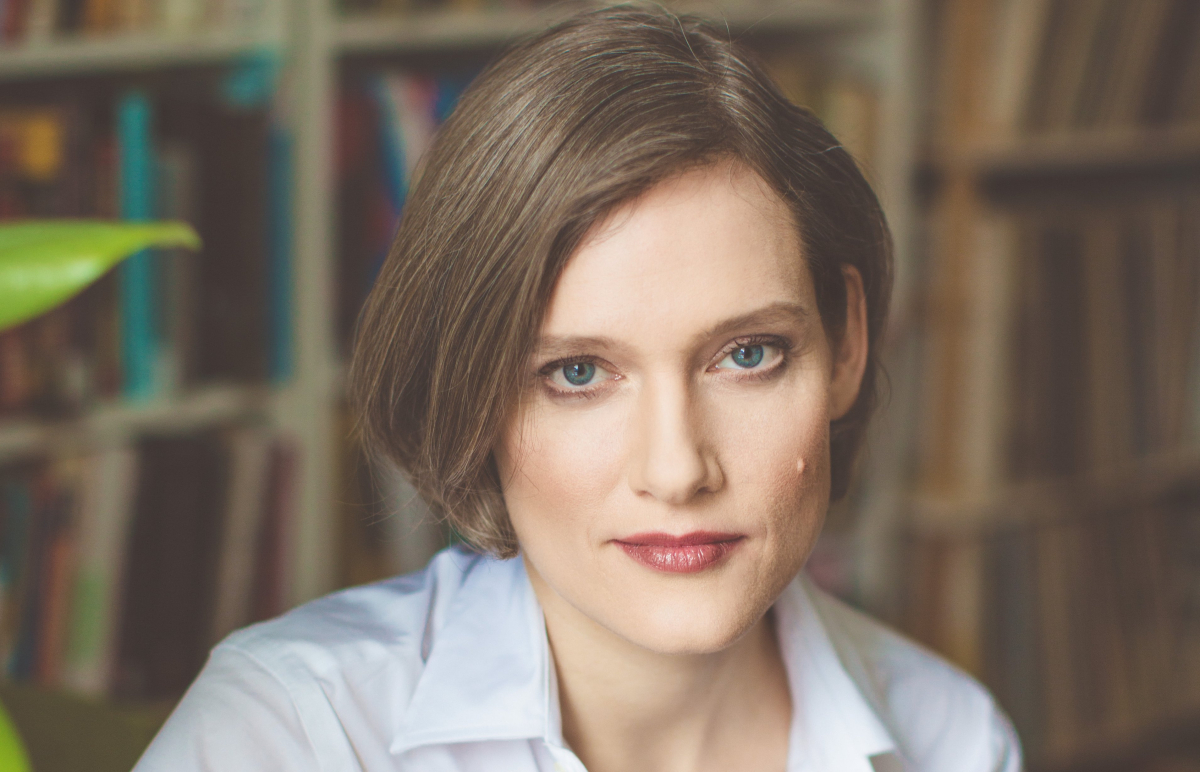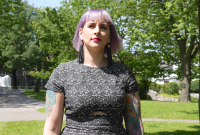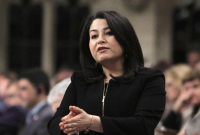Support strong Canadian climate journalism for 2025
Award-winning Montreal novelist Heather O'Neill is sick to her stomach. She just finished reading a troubling essay about the goings on at the English department of a major Canadian university.
It was "very triggering and upsetting," she says.
She thought it perfectly mirrored her own experiences while a student. But it was also equally frustrating to see that people were reacting differently to long-standing allegations, now that a man had confirmed them. These are the same allegations that many women had been talking about for years, she said.
“When I was subjected to sexual harassment at Concordia, I was young and vulnerable, and I didn't know how to react to it or how to report it or even how wrong it was,” O’Neill, 44, tells me in an interview. “In retrospect, it just horrifies me that I had to go through that.”
The essay that triggered her reaction spread like wildfire across online networks after it was posted on Jan. 8. The piece was called, "No Names, Only Monsters: Toxic Masculinity, Concordia and CanLit." In it, former Concordia student Mike Spry exposes the undergraduate creative writing department at Concordia University and the Canadian literary scene, also known as "CanLit," as places where nepotism, abuse,and overinflated egos reign, and where women routinely endure a poisonous structure that enables and allows the men in power to abuse their entitlement; often manifesting itself as sexual predation.
Spry goes on to explain how the exclusive and insular CanLit scene, often functioning primarily as a conduit between university departments and small government-grant-operated publishing presses, protects “its own monsters from public indictment.”
Witness attests to 'innumerable' transgressions
The accusation is that, just like most power structures where workplace harassment and sexual abuse are prevalent, a culture of silence and complicity protects the abusers and allows the abuse — centred and fed by unequal power dynamics — to go on for years. Spry alleges that over the years, he witnessed and was made aware of “innumerable instances of unwanted affection, groping, inappropriate remarks and propositions” by professors, which, if met by rejection, would result in the denigration and degradation of the women who rejected them.
The allegations have prompted Concordia's president, Alan Shepard to launch an investigation within the department and assess the situation across the entire university.
Spry minces no words in his exposé:
“English departments and publishers are guilty of sustaining this environment. Publishers could end this cycle of abuse by simply refusing to endow those who abuse the agency and legitimacy that they provide. The departments could fire professors, withhold tenure, censure faculties, punish deans. At the very least they could prohibit fifty-year-old profs from trying to date twenty-year-old students. They all know about profs/writers harassing, abusing, and inappropriately dating students. They all know about drunken nights of misbehavior. They all know of the prevalent lechery of writers.
“Even if a student comes forward, nothing is done. English and creative writing departments across Canada and the US knowingly cultivate environments that are criminally unsafe for young women and aspiring writers.”
Despite his candid revelations, Spry stops short of doing one major thing; naming the people he was talking about.

Online testimonials pour in
But Spry also referenced a previous piece published in 2014 by Toronto-based writer Emma Healey. She had written her own graphic essay revealing a consensual, yet troubling relationship with a prominent author and professor at Concordia University that began when she was a 19-year-old student in 2010.
Moments after Spry's piece was published, Healey shared the piece with the comment: “I published that Hairpin piece five years ago. This is the first time a man this close to the situation has acknowledged it publicly and unequivocally for what it was AND drawn something bigger with it than a self-flagellating Facebook post about f*cking up.”
Although some prominent names have surfaced on social media, Shepard, the Concordia president, declined to say who was under investigation, telling reporters at a news conference on Wednesday in Montreal that any person accused of wrongdoing deserved to have due process.
He also defended the university for failing to act earlier, despite years of rumours.
"I acted on it on Monday afternoon, because I heard about it on Monday afternoon," Shepard said. "It wasn't an open secret to me... I wasn't aware. If I had been aware, I would have acted sooner."
But the upcoming investigation will have a lot of allegations to tackle as more women come forward with their own troubling allegations.
Concordia University student Domenica Martinello said that her brief teaching experience had in fact infuriated her, regarding how many profs treated “the privilege that is teaching as a hellish, extended man-baby midlife crisis.”
Author Gersande La Fleche tweeted that they had “too many Concordia stories they couldn't tell because they share them with people who are not ready to come forward yet.” La Fleche also went on to say that “a lot of the stuff that they had read today corroborates in a big way my own stories, and the stories I share with others, and the stories that have been shared by me.”
Writer Jess Rowan Marcotte, who was managing editor of Matrix (a literary magazine affiliated with the creative writing program at Concordia University) from fall 2012 to spring 2015 would later corroborate both Healey’s and Spry’s allegations in a Twitter thread of their own.
And there are many more. A quick hashtag search of #CanLit and #Concordia on Twitter nets numerous troubling tweets by former students who seem neither surprised nor in any denial of these revelations.
Abuse is prevalent and across the board
O’Neill, the award-winning novelist who was a student at Concordia’s creative writing program, quickly took to Twitter to remind everyone that she had been openly and publicly talking about sexual misconduct at Concordia since the late 1990s. In a subsequent CBC interview she revealed that she too had been harassed by an older professor who kept attempting to sleep with her for a year. She referred to Spry’s blog piece as “an accurate picture of the climate of the program at that time." She cited the fear of being blacklisted and never being published as reasons for people not coming forward.
And that’s often the problem with sexual assault in a workplace environment. Because of the power imbalance, the victims are often too afraid of repercussions to file a complaint and the people not directly affected, yet still aware, often turn a blind eye because it doesn't benefit them in any way. Too often the culture of silence creates a convoluted mess of complicity that downplays the incident as a solitary one.
But it never is. Allegations of sexual misconduct have rocked academia for some time now and in today’s climate of increased awareness and #MeToo revelations, it’s not unreasonable to expect that more will see the light.
In 2016, author Steven Galloway was fired from the University of British Columbia following a months-long investigation into what the university called "a record of misconduct that resulted in an irreparable breach of trust."
In 2014, a Ph.D. student filed a complaint against a professor at Université du Québec à Montréal (UQAM) who repeatedly sexually harassed her. She won her case, but she still doesn't know what, if any, sanctions the professor faced.
In an interview I conducted (under a condition of anonymity) with a former Concordia student, she said she had heard of similar stories in other departments.
“When I was at Concordia, I knew of a professor who groomed a student when she was still underage — the predictable, ‘You’re so intelligent and mature beyond your years’ routine — and he would be smuggling her into the Hall Building after hours, past security, to come to his office so he could sleep with her. You’re 18 years old and you’re flattered that this sophisticated older man has taken an interest in you, and you don’t yet get that this is so inappropriate.”
Which brings us to the issue of consensual, yet highly questionable student-teacher relationships. Even though most universities have a sexual assault resource centre, the problem with not having a rigid code of conduct that explicitly forbids teacher-student relations (Concordia, like many universities, does not have one) is that, due to the power imbalance, the students themselves may not identify it as such, may not see the incidents as abuse of power, but as isolated cases of attraction. Even when some of these instigators are faculty members with well-documented patterns of predatory behaviour.

Time for a change in university conduct code?
All these allegations and possible complaints of assault, harassment and misconduct bring up the question of whether the current policies in academia are doing enough to protect students.
While the argument can be made that undergraduate and graduate students are legal adults and sometimes relationships do develop between people of legal consenting age in a workplace or educational environment, the fact of the matter remains that there is a major power imbalance here and one that can easily be exploited. The issues of consent and conflict of interest are at least two major reasons to discourage sexual relations between faculty and students.
There is a significant power differential, as faculty have the power to not only grade and evaluate students’ work, but to also write referral letters, open doors both in the workplace and in academia, and act as mentors and counsellors. That not only prevents victims from often coming forward, it also brings up the question of whether it prevents students from being in a position to truly consent to any type of relationship.
“There is no consent in a power relationship like that,” O’Neill says emphatically. “I think it’s absolutely a form of abuse and I don’t understand why it’s permitted in a university setting. I think one of the first steps they need to take is to make this unacceptable and to make it a policy that this is not allowed. As a woman I find it intolerable and it should not be happening… There are so many professors that are dating students. There is no penalty for it, the university looks the other way and it’s almost seen as some sort of twisted perk of the job. It needs to stop.”
Right now, with nothing explicitly forbidding professors from dating students, academic institutions would do well to address the weaknesses in their own conduct codes that basically enables, and possibly facilitates, this behaviour and places the onus of proof on the students to explain why they feel wronged or taken advantage of; ultimately protecting the professor in the long run. With a change in the conduct code, the onus would automatically fall on the professors because the code of conduct would clearly stipulate that it’s wrong and they could lose their job.
“With a policy it would be so easy for students to rebuff the professors’ advances and simply say, 'No, we’re not allowed to do this,”' adds O’Neill. “Now it puts them in such awkward positions when you’re hit on by these professors and they have to figure out how to go about rejecting them without jeopardizing their careers.”
The former Concordia student speaking anonymously also agrees. “Working in a university is something a professor should take extremely seriously,” she says. “Even if the most attractive student comes into your office and takes off all his clothes, the onus is on the professor to say no, because they're the adult, they're the professional, they're the person in a power position. Universities should be a place of security and trust for students and when that does not occur or when a blind eye is turned, it’s a real shame and the damage that happens to students is long-lasting.”
Are universities doing enough to protect their students?
While Concordia University has urged students to contact the institution’s Office of Rights and Responsibilities and share their stories, it’s quite telling that so many former and current students don’t trust that they will be treated fairly and with the respect that their complaints deserve. The overwhelming sentiment expressed by many online seems to be that universities will protect their faculty members and reputations first and foremost. There have been many cases in the past when students or employees felt that they had not had their complaints of rape culture or sexual harassment treated seriously.
Many have advised those wishing to file a complaint against a professor to first speak to their student advocacy centre, where someone can help them navigate the process and is much more familiar with the system.
“I’m glad that Concordia is responding to the allegations, but even the president admitted that he’s partly doing so because it’s now in the news cycle,” says O’Neill. “Didn't he feel morally compelled to react to this years ago?”
O’Neill holds hope that the #MeToo momentum will move things forward. But she also recognizes that this pattern of abuse in academia is widespread and pervasive and not at all limited to Concordia. Seeing the exact same culture of abuse exist today frustrates her, but she believes that, for the first time, women are being believed when they come forward.






Comments
I think Toula has made some very good points in discussing the troubling situation of sexual harassment at Concordia-particularly about the nature of relationships between professors and students. Even if they are consensual, there is an imbalance of power in these relationships that can be cause for trouble. This kind of a relationship is problematic for a support staff like myself if I had a sexual relationship with a student who was working in my department where the relationship wasn't equal. Perhaps that should be the first place to start with, and then move on the aspects of the English department that create this toxic environment.
Thank you. Personally, I think it's THE question to be asking.
It is the question worth asking, and it doesn't just apply to the English department but in all of work situations-including my own. Workplace relationships come with a lot of issues anyway, but ones that exist between people in different positions of authority come with even more. Clarity here would help out a lot.
Thirty years ago I was an adult student at UVic and had a couple of young female friends who started out in creative writing. They, and other women, dropped out in the first semester (transferring to an English major) due to the hostile and misogynistic culture in the department. It was not uncommon to see these packs of Hemmingway wanna-bees drinking with one of the high profile male professors in a downtown bar. I kept up with this group of future writers out of curiosity and used to engage them in discussion about their sexist writings and question them on why the women mostly dropped out. They never saw their behavior and that of their profs as anything but the path of the true writer and that the women couldn't cut it. One shy young woman who had tried to hang in there dropped out due to illness. The rumor was she had mono. I only found out later from one of these guys girlfriends that this student had dropped out due to the constant harassment of one of the instructors. And I still recall the outrage from this group when one of the sessionals was passed over for a tenure track position in favor of a female writer. I'm hoping that even back then UVic realized something was wrong in the faculty. I may try looking up some of my former classmates to get a better impression. But my impression was it was a horrible faculty if you were a woman.